- Home
- Lisa Kleypas
Cold-Hearted Rake Page 4
Cold-Hearted Rake Read online
Page 4
“Have I?” West looked perturbed. “Forgive me – I seem to have become accidentally lucid.” He reached for his wineglass. “Eversby Priory is one of the finest sporting estates in England. Perhaps we should shoot grouse tomorrow.”
“Splendid,” Devon said. “I would enjoy beginning the day with killing something.”
“Afterward we’ll meet with the estate agent and solicitor, and find out what’s to be done with this place.” West glanced at him expectantly. “You haven’t yet told me what happened this afternoon while you were out walking with Lady Trenear.”
Devon shrugged irritably. “Nothing happened.”
After introducing him to Helen, Kathleen had been abrupt and cool for the rest of the tour through the glasshouses. When they parted company, she had worn the relieved air of someone who had concluded an unpleasant duty.
“Did she wear the veil the entire time?” West asked.
“No.”
“What does she look like?”
Devon shot him a derisive glance. “Why does that matter?”
“I’m curious. Theo had his pick of women – he wouldn’t have wed an ugly one.”
Devon turned his attention to his wineglass, swirling the vintage until it glittered like black rubies. There seemed no way to accurately describe Kathleen. He could say that her hair was red and that her eyes were golden-brown and tip-tilted like a cat’s. He could describe her fair skin and the rosy undertone that rose to the surface like a winter sunrise. The way she moved, her supple athletic grace constrained by laces and stays and layers. But none of that explained the fascination she held for him… the sense that somehow she had the power to unlock some altogether new feeling inside him, if only she cared to try.
“If one were to measure strictly by appearance,” Devon said, “she’s pleasing enough to bed, I suppose. But she has the temperament of a baited badger. I’m going to boot her from the estate as soon as possible.”
“What of Theo’s sisters? What will become of them?”
“Lady Helen is suited for employment as a governess, perhaps. Except that no married woman in possession of her wits would ever hire a girl that pretty.”
“She’s pretty?”
Devon gave him a forbidding glance. “Stay away from her, West. Far away. Don’t seek her out, don’t speak to her, don’t even look at her. The same goes for the twins.”
“Why not?”
“They’re innocent girls.”
West gave him a caustic glance. “Are they such fragile flowers that they couldn’t tolerate a few minutes of my company?”
“‘Fragile’ is not the word I would use. The twins have spent years scampering about the estate like a pair of foxes. They’re unworldly and more than a little wild. God knows what’s to be done with them.”
“I pity them, if they’re sent out into the world without a man’s protection.”
“That’s not my concern.” Devon reached for the carafe of wine and refilled his glass, trying not to think of what would become of them. The world wasn’t kind to innocent young women. “They were Theo’s responsibility. Not mine.”
“I believe this is the part in the play,” West mused, “when a noble hero would appear to save the day, rescue the damsels, and set everything to rights.”
Devon rubbed the corners of his eyes with the pads of his thumb and forefinger. “The truth is, West, I couldn’t salvage this damned estate, or save the damsels, even if I wanted to. I’ve never been a hero, nor do I have any wish to be.”
“… in light ofthe late earl’s failure to provide legitimate male issue,” the family solicitor droned the next morning, “according to the legal rule of perpetuities, which renders the devise of entail void for remoteness, the settlement has expired.”
As an expectant silence filled the study, Devon looked up from a pile of leases, deeds, and account books. He was meeting with the estate agent and solicitor, respectively Mr. Totthill and Mr. Fogg, neither of whom appeared to be a day under ninety.
“What does that mean?” Devon asked.
“The estate is yours to do with as you please, my lord,” Fogg said, adjusting his pince-nez to regard him owlishly. “At present, you are not bound by entail.”
Devon’s gaze shot to West, who was lounging in the corner. They exchanged relieved glances. Thank God. He could sell the estate in parts or in its entirety, pay off the debt, and go on his way with no further obligation.
“I will be honored to assist you in resettling the entail, my lord,” Fogg said.
“That won’t be necessary.”
Both the estate manager and solicitor looked perturbed at Devon’s reply.
“My lord,” Totthill said, “I can assure you of Mr. Fogg’s competence in such matters. He has twice assisted in resettling the entail for the Ravenels.”
“I don’t doubt his competence.” Relaxing back in his chair, Devon propped his booted feet on the desk. “However, I don’t want to be limited by an entail, since I intend to sell the estate.”
A shocked silence greeted his pronouncement.
“What portion of it?” Totthill dared to ask.
“All, including the house.”
Aghast, the two men burst out with protests… Eversby Priory was a historic inheritance, won through the service and sacrifice of his ancestors… Devon would have no respectable position without retaining at least a fragment of the estate… Surely he could not mean to disgrace his future offspring by leaving them a landless title.
Exasperated, Devon gestured for the pair to be silent. “Trying to preserve Eversby Priory would involve far more effort than it’s worth,” he said flatly. “No rational man would conclude otherwise. As for my future offspring, there won’t be any, since I have no intention of marrying.”
The estate manager cast an imploring glance at West. “Mr. Ravenel, you cannot support your brother in this folly.”
West extended his hands as if they were a set of weighing scales, and compared invisible counterbalances. “On one hand, he has a lifetime of responsibility, debt, and drudgery. On the other, he has freedom and pleasure. Is there really a choice?”
Before the elderly men could respond, Devon spoke briskly. “The course is set. To begin with, I want a list of investments, deeds, and interests, as well as a complete inventory of every item in the London house and the estate. That includes paintings, tapestries, rugs, furniture, bronzes, marbles, silverware, and the contents of the glasshouses, the stables, and the carriage house.”
Totthill asked dully, “Will you want an estimate of all the livestock, my lord?”
“Naturally.”
“Not my horse.” A new voice entered the conversation. All four men looked to the doorway, where Kathleen stood as straight and rigid as a blade. She stared at Devon with open loathing. “The Arabian belongs to me.”
Everyone rose to his feet except for Devon, who remained seated at the desk. “Do you ever enter a room the ordinary way?” he asked curtly, “or is it your usual habit to slink past the threshold and pop up like a jack-in-the-box?”
“I only want to make it clear that while you’re tallying the spoils, you will remove my horse from the list.”
“Lady Trenear,” Mr. Fogg interceded, “I regret to say that on your wedding day, you relinquished all rights to your movable property.”
Kathleen’s eyes narrowed. “I’m entitled to keep my jointure and all the possessions I brought to the marriage.”
“Your jointure,” Totthill agreed, “but not your possessions. I assure you that no court in England will regard a married woman as a separate legal being. The horse was your husband’s, and now it belongs to Lord Trenear.”
Kathleen’s face went skull-white, and then red. “Lord Trenear is stripping the estate like a jackal with a rotting carcass. Why must he be given a horse that my father gave to me?”
Infuriated that Kathleen would show him so little deference in front of the others, Devon stood from the desk and approached her in a
few strides. To her credit, she didn’t cower, even though he was twice her size. “Devil take you,” he snapped, “none of this is my fault.”
“Of course it is. You’ll seize on any excuse to sell Eversby Priory because you don’t want to take on a challenge.”
“It’s only a challenge when there’s some small hope of success. This is a debacle. The list of creditors is longer than my bloody arm, the coffers are empty, and the annual yields have been cut in half.”
“I don’t believe you. You’re planning to sell the estate to settle personal debts that have nothing to do with Eversby Priory.”
Devon’s hands knotted with the urge to destroy something. His rising bloodlust would only be satisfied with the sound of shattering objects. He had never faced a situation like this, and there was no one to give him trustworthy advice, no kindly aristocratic relation, no knowledgeable friends in the peerage. And this woman could only accuse and insult him.
“I had no debt,” he growled, “until I inherited this mess. God’s bollocks, did your idiot husband never explain any of the estate’s issues to you? Were you completely ignorant of how dire the situation was when you married him? No matter – someone has to face reality, and Christ help us all, it seems to be me.” He turned his back on her and returned to the desk. “Your presence isn’t wanted,” he said without looking back. “You will leave now.”
“Eversby Priory has survived four hundred years of revolutions and foreign wars,” he heard Kathleen say contemptuously, “and now it will take but one self-serving rake to bring it all to ruins.”
As if he were entirely to blame for the situation. As if he alone would be accountable for the estate’s demise. Damn her to hell.
With effort, Devon swallowed back his outrage. Deliberately he stretched out his legs with relaxed indolence and glanced at his brother. “West, are we quite certain that Cousin Theo perished in a fall?” he asked coolly. “It seems far more likely that he froze to death in the marital bed.”
West chuckled, not above the enjoyment of a malicious quip.
Totthill and Fogg, for their part, kept their gazes down.
Kathleen crossed the threshold and sent the door shuddering with a violent slam.
“Brother,” West said with mock chiding, “that was beneath you.”
“Nothing’s beneath me,” Devon replied, stone-faced. “You know that.”
For a long time after Totthill and Fogg had left, Devon remained at the desk and brooded. Opening an account book, he paged through it without absorbing anything. He was barely aware of the moment when West wandered out of the study, yawning and grumbling. Feeling strangled, Devon unknotted his necktie with a few impatient tugs and opened the front of his collar.
Christ, how he wanted to be back at his London terrace, where everything was well maintained and comfortable and familiar. If Theo were still the earl, and he were still merely the black sheep cousin, he would have gone for a morning ride on the Hyde Park bridle path, and afterward he might have enjoyed a good meal at his club. Later he would have met with friends to watch a boxing match or a horse race, attend the theater, and chase after lightskirts. No responsibility, nothing to worry about.
Nothing to lose.
The sky rumbled as if to underscore his sullen spirits. Devon cast a murderous glance at the window. Rain-tumbled air had pushed inland to settle over the downs, darkening the sky to vestment-black. It would be a ripper of a storm.
“My lord.” A timid rap at the doorjamb drew his attention.
Recognizing Helen, Devon rose to his feet. He tried to make his expression pleasant. “Lady Helen.”
“Forgive me for disturbing you.”
“Come in.”
Helen entered the room cautiously. Her gaze swerved to the window before moving back to him. “Thank you, my lord. I came to tell you that with the storm moving in so fast, I would like to send out a footman to search for Kathleen.”
Devon frowned. He hadn’t been aware that Kathleen had left the house. “Where is she?”
“She has gone to visit the tenant farm on the other side of the hill. She took a basket of broth and elderberry wine to Mrs. Lufton, who is recovering from childbirth fever. I asked Kathleen if I could accompany her, but she insisted on walking alone. She said she needed the solitude.” Helen’s fingers wove together into a pale knot. “She should have returned by now, but the weather has come in so quickly that I fear she might be caught out in it.”
There was nothing in the world that Devon would love more than the sight of Kathleen rain-soaked and bedraggled. He had to restrain himself from rubbing his hands together in villainous glee.
“There’s no need to send a footman,” he said casually. “I’m certain that Lady Trenear will have the sense to stay at the tenant farm until the rain passes.”
“Yes, but the downs will have turned to mud.”
Better and better. Kathleen, wading through mud and clay. Devon fought to keep his expression grave, when inside all was joy and exploding Roman candles. He went to the window. No rain yet, but dark clouds seeped through the sky like ink on wet parchment. “We’ll wait a bit longer. She could return momentarily.”
Lightning bolts pierced the firmament, a trio of brilliant jagged streaks accompanied by a series of cracks that sounded like shattering glass.
Helen drew closer. “My lord, I am aware that you and my sister-in-law exchanged words earlier —”
“‘Exchanged words’ would imply that we had a civilized debate,” he said. “Had it lasted any longer, we would have torn each other to shreds.”
A frown corrugated her smooth brow. “You both find yourself in difficult circumstances. Sometimes that causes people to say things they don’t mean. However, if you and Kathleen could manage to set aside your differences —”
“Lady Helen —”
“Do call me cousin.”
“Cousin, you will avoid much future distress if you learn to see people as they really are, instead of as you wish them to be.”
Helen smiled faintly. “I already do.”
“If that were true, you would understand that Lady Trenear and I are correct in our assessments of each other. I am a scoundrel, and she is a heartless bitch who’s entirely capable of looking after herself.”
Helen’s eyes, the silvery-blue of moonstones, widened in concern. “My lord, I have come to know Kathleen very well in our shared grief over my brother’s passing —”
“I doubt she feels much grief,” Devon interrupted brusquely. “By her own admission, she hasn’t shed a single tear over your brother’s death.”
Helen blinked. “She told you that? But she didn’t explain why?”
Devon shook his head.
Looking perturbed, Helen said, “It isn’t my story to tell.”
Concealing an instant flare of curiosity, Devon shrugged casually. “Don’t concern yourself with it, then. My opinion of her won’t alter.”
As he had intended, the show of indifference pushed Helen into talking. “If it helps you to understand Kathleen a little better,” she said uncertainly, “perhaps I should explain something. Will you swear on your honor to keep it in confidence?”
“Of course,” Devon said readily. Having no honor, he never hesitated to promise something on it.
Helen went to one of the windows. Fissures of lightning crackled across the sky, illuminating her delicate features with a blue-white flash. “When I didn’t see Kathleen cry after Theo’s accident, I assumed it was because she preferred to keep her emotions private. People have different ways of grieving. But one evening as she and I sat in the parlor with needlework, I saw her prick her finger, and… she didn’t react. It was as if she hadn’t even felt it. She sat watching a drop of blood form, until I couldn’t bear it any longer. I wrapped her finger with a handkerchief, and asked what was the matter. She was ashamed and confused… she said she never cried, but she thought that she would have at least been able to shed some tears for Theo.”
Helen paused, seeming preoccupied with removing a flake of peeling paint from the wall.
“Go on,” Devon murmured.
Meticulously Helen set the flake of paint on the windowsill, and picked at another, as if she were pulling scabs from a half-healed wound. “I asked Kathleen if she could ever remember crying. She said yes, when she was a little girl, on the day she left Ireland. Her parents had told her they were all traveling to England on a three-masted steamer. They went to the docks and made as if to board the ship. But as Kathleen and her nanny stepped onto the gangplank, she realized that her parents weren’t following. Her mother told her that she was going to stay with some very nice people in England, and they would send for her someday when they didn’t have to travel abroad so often. Kathleen became quite frantic, but her parents turned and walked away, while the nanny dragged her aboard.” Helen sent him a sidelong glance. “She was only five years old.”

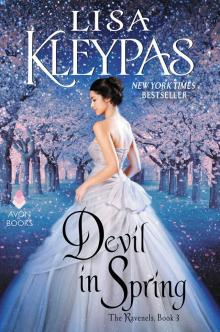 Devil in Spring
Devil in Spring Sugar Daddy
Sugar Daddy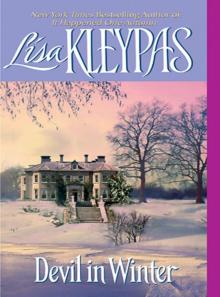 Devil in Winter
Devil in Winter Dreaming of You
Dreaming of You Christmas Eve at Friday Harbor
Christmas Eve at Friday Harbor Love, Come to Me
Love, Come to Me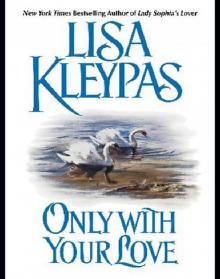 Only With Your Love
Only With Your Love Suddenly You
Suddenly You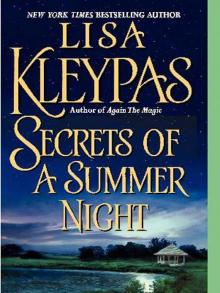 Secrets of a Summer Night
Secrets of a Summer Night Cold-Hearted Rake
Cold-Hearted Rake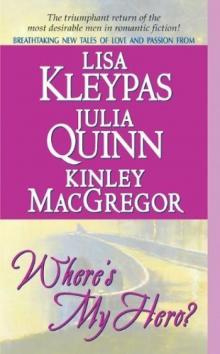 Where's My Hero?
Where's My Hero? Gifts of Love
Gifts of Love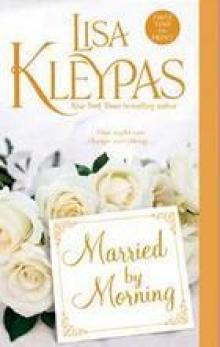 Married by Morning
Married by Morning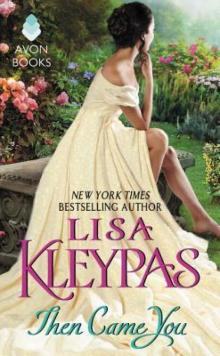 Then Came You
Then Came You Wish List
Wish List Where Dreams Begin
Where Dreams Begin A Historical Christmas Present
A Historical Christmas Present Somewhere I'll Find You
Somewhere I'll Find You Scandal in Spring
Scandal in Spring Someone to Watch Over Me
Someone to Watch Over Me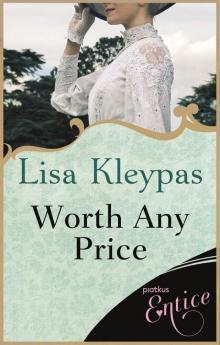 Worth Any Price
Worth Any Price Prince of Dreams
Prince of Dreams It Happened One Autumn
It Happened One Autumn Love in the Afternoon
Love in the Afternoon Devil's Daughter
Devil's Daughter A Wallflower Christmas
A Wallflower Christmas Tempt Me at Twilight
Tempt Me at Twilight Brown-Eyed Girl
Brown-Eyed Girl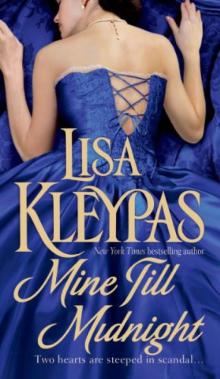 Mine Till Midnight
Mine Till Midnight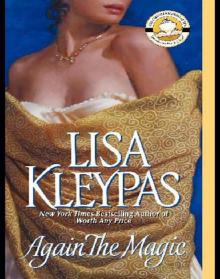 Again the Magic
Again the Magic Lady Sophia's Lover
Lady Sophia's Lover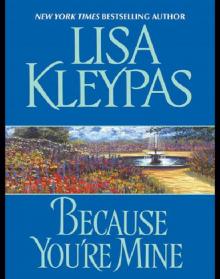 Because You're Mine
Because You're Mine Midnight Angel
Midnight Angel Smooth-Talking Stranger
Smooth-Talking Stranger Blue-Eyed Devil
Blue-Eyed Devil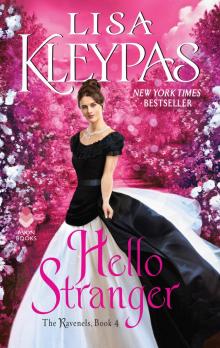 Hello Stranger
Hello Stranger Dream Lake
Dream Lake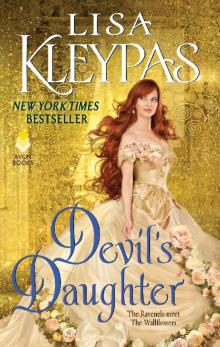 Devil's Daughter: The Ravenels Meet the Wallflowers
Devil's Daughter: The Ravenels Meet the Wallflowers A Christmas to Remember
A Christmas to Remember Smooth Talking Stranger
Smooth Talking Stranger Crystal Cove
Crystal Cove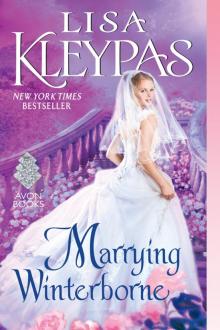 Marrying Winterborne
Marrying Winterborne Stranger in My Arms
Stranger in My Arms Devil in Disguise
Devil in Disguise Worth Any Price bsr-3
Worth Any Price bsr-3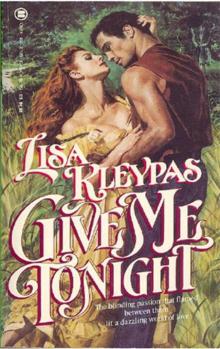 Give Me Tonight
Give Me Tonight Rainshadow Road fh-2
Rainshadow Road fh-2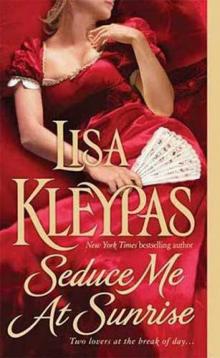 Seduce Me At Sunrise
Seduce Me At Sunrise I Will
I Will Someone to Watch Over Me bsr-1
Someone to Watch Over Me bsr-1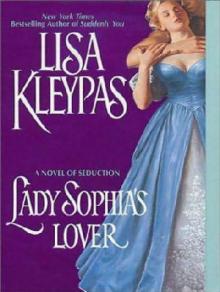 Lady Sophias Lover bsr-2
Lady Sophias Lover bsr-2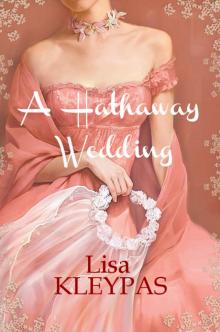 A Hathaway Wedding
A Hathaway Wedding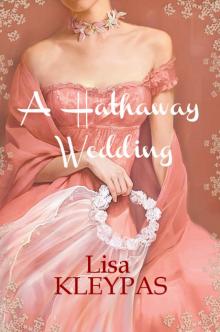 A Hathaway Wedding (Hathaways Bk2.5)
A Hathaway Wedding (Hathaways Bk2.5) Worth Any Price - Bow Street 3
Worth Any Price - Bow Street 3 Christmas with Holly
Christmas with Holly